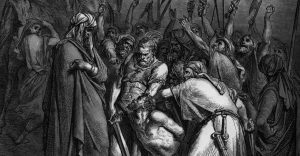One of the many challenges minority social groups encounter is developing and maintaining a positive social identity. To do so, they may engage in a variety of strategies known collectively as ‘social creativity’.[1] One simple example is the way early Jesus followers took the name ‘Christian’ (originally a slur) and claimed it as a positive designation (1 Peter 4:16). This inversion of meaning is but one example of social creativity and one that Peter uses on numerous occasions in his letter.
Now, imagine growing up in a country where you share the same faith and values with over 90% of the population, and then have a conversion experience to another faith. Overnight, you have just moved from the majority 90% to the minority 10%. I have Christian friends from nations such as Cambodia, India, Iraq, and other such places for whom this is their story. They were raised in a Buddhist, Hindu, or Muslim context, and then they encountered Jesus and everything changed. They were still home, but no longer at home. Though they looked the same as they did before; though they ate the same as they did before; and though they work the same jobs as they did before, they were now different. Their encounter with Jesus had rendered them aliens in their homelands and they must learn to navigate this new reality. So too, the original recipients of 1 Peter.
Elect Sojourners
As a consequence of coming to faith in Christ, the recipients of 1 Peter found themselves as outsiders at home. They had become resident aliens, strangers, and weirdos having decided to throw in their lot with a crucified saviour.[2] Peter addresses this problem theologically by tying the concepts of election and rejection together, and sociologically through strategies of social creativity. At the beginning of the letter Peter refers to his recipients as ‘elect sojourners’ (1 Peter 1:1, my translation throughout). From the outset, Peter wants his audience to see themselves in this light. They are the elect of God and citizens of his kingdom. But in relation to the world, they now stand as sojourners who don’t quite belong like they once used to. Peter concludes by writing, ‘She who is in Babylon, chosen together with you, sends you her greetings’ (1 Peter 5:13). In its immediate context, ‘Babylon’ almost certainly refers to the city of Rome.
Peter is writing from Rome to the fledgling churches of ancient Turkey who are trying to navigate life as new believers in Christ amid a world that was growing increasingly hostile towards their faith. Babylon emphasises the alienness of being a Christian believer within the Roman Empire. Whatever Babylon/Rome is, it is, categorically, not home. ‘Chosen’, or ‘elect’, emphasises the Church’s standing before God. He has called them to be his people, set aside for his purposes, to be a blessing (see 1Peter 1:15; 2:9, 21; 3:9; 5:10). Babylon, which evokes the experience of the Old Testament Israelites, exiled to Babylon, acts as a fitting metaphor on which to conclude the letter that, from the outset, depicts its recipients as elect sojourners or exiles (1 Peter 1:1).
Election/Rejection in 1 Peter
The mention of Babylon in close association with the concept of election serves to reinforce the position of these Christian believers in the world. They are chosen by God and yet rejected by the world. This election/rejection framework informs the whole letter of 1 Peter and is elaborated in numerous ways, most importantly in relation to Christ. For example, in 1Peter 1:13–21, the election motif appears in the Anatolian Christians being called by God to be holy, bringing them into a familial relationship with him whereby he becomes their Father (1Peter 1:17), and they become his children (1Peter 1:14a). The motif of rejection (or perhaps better, in this case, separation) appears in the instruction to no longer conform to ignorant passions (1Peter 1:14b), having left behind the idolatrous ways of their forefathers (1Peter 1:18). This transition to a new paternity and new way of life is made possible by the redemption that comes through Christ’s blood sacrifice (1Peter 1:19).
1 Peter 2:4–10 shows how the election/rejection theme is embodied by Jesus: the ‘Living Stone’, rejected by men but chosen by God (1 Peter 2:4). Jesus is the rejected stone that became the cornerstone of a new temple and priesthood (1Peter 2:7). Accordingly, honour is given from God to those who believe in him (1Peter 2:7, see the ESV on this verse), even as they are labelled as evildoers in the world (1Peter 2:12). And while the world may reject them, they are ‘an elect kinsfolk, a royal priesthood, a holy nation, a people belonging to God’ (1Peter 2:9a). They are to proclaim his mighty acts as those ‘called out of darkness into his marvellous light’ (1Peter 2:9b). These verses reveal that Peter is engaging in a form of social creativity that inverts definitions of honour and shame through the doctrine of election. The world’s rejection of Jesus, culminating in his crucifixion and death, is turned into honour and triumph through Jesus’ resurrection: death to life; dishonour to honour; rejected stone, to elected cornerstone. And Peter’s message is that what is true of Christ is likewise true for those who come to him in faith.
Living in Babylon
It is important to now step back and recall that for the recipients to whom Peter wrote, ‘Babylon’ was home; in fact, ‘Babylon’ still is home, but not like it used to be. In the blink of an eye, these new Christians became ‘resident aliens’ by virtue of their newfound faith (1 Peter 2:11). In a strange way, then, Babylon is the place that is simultaneously home, and yet not home. It has become a place of sojourn and hence a place of mission, suffering, and blessing. Such circumstances evoke Jeremiah’s letter to the exiles in Babylon that instructs them to put down roots in Babylon and seek to be a blessing:
Build houses and live in them; plant gardens and eat their produce. Take wives and have sons and daughters; take wives for your sons, and give your daughters in marriage, that they may bear sons and daughters; multiply there, and do not decrease. Also, seek the peace and prosperity of the city to which I have carried you into exile. Pray to the Lord for it, because if it prospers, you too will prosper.” (Jeremiah 29:5–7)
Remarkably, being a blessing meant they were to also seek the prosperity of Babylon and in so doing find their own prosperity. In short, the Israelites were to make Babylon their home, even though deep down it was clearly not their home. They were to put down roots, invest in the city, and build a life by which the Babylonians would encounter God’s character through them. This is hope-filled living with a view to one’s true home. In much the same way, Peter’s audience—and Christians through the ages—live in a world that is home and yet not home. Like the Israelites in Babylon and the Christian believers in ancient Turkey, we too are called to hope-filled living with a view to the new creation by seeking the blessing and shalom of the places to which God has called us.
[1] ‘Social creativity’ is term used by sociologists and psychologists to describe a collection of tactics that attempt to boost the social identity of vulnerable group members.
[2] It is also likely that some among the Anatolian churches to whom Peter writes were displaced people in the literal sense of the term.















